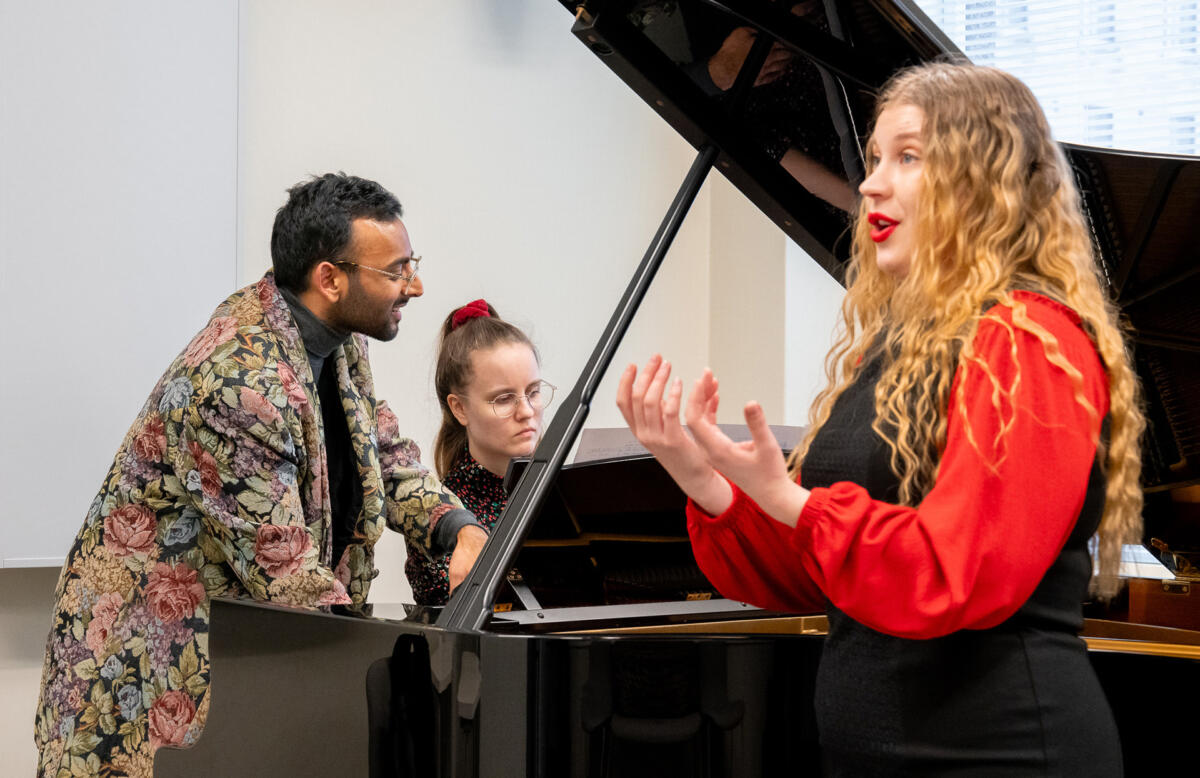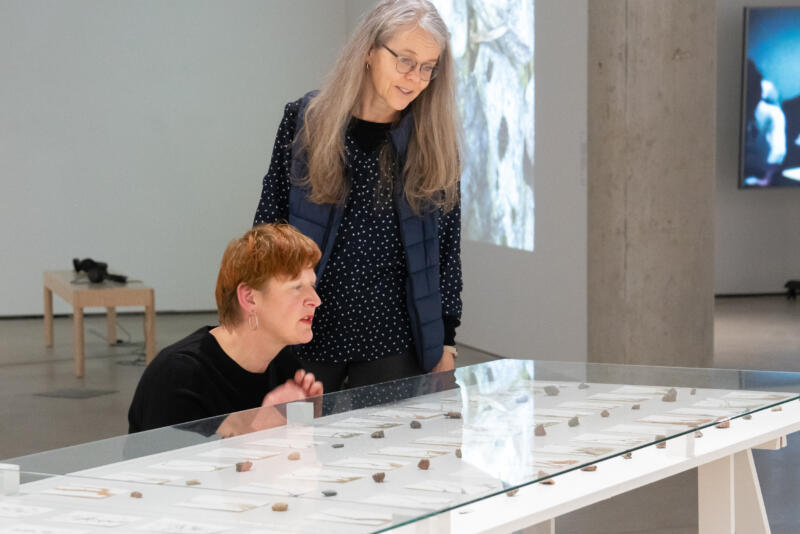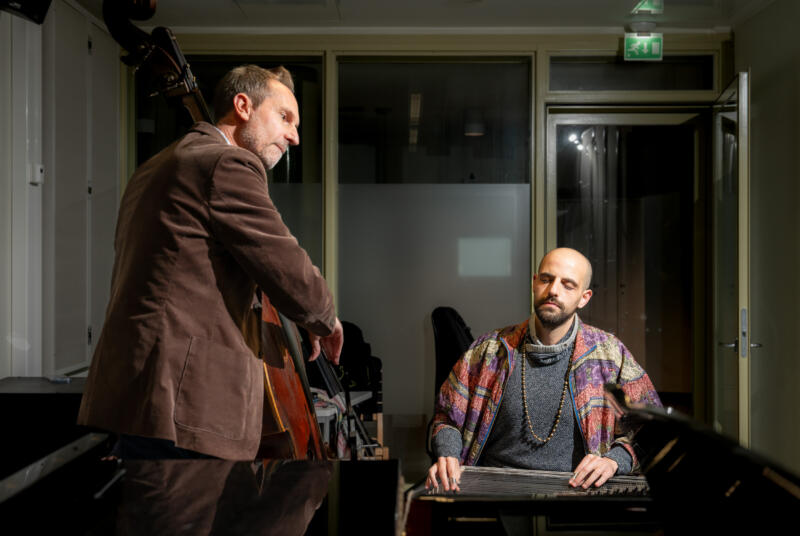Becoming a master: Keval Shah, Emma Hartikainen and Tanja Niiranen
“It was the first time they had made music together, and my first ever class at the Academy. It stands out for me as a wonderful start to a beautiful journey together.”

In this interview series an art student and teacher discuss their shared learning journey.
Tell us who are you and what do you do at Uniarts Helsinki
Emma & Tanja: We are soprano Emma Hartikainen and pianist Tanja Niiranen. Emma is studying in the Opera master’s program and Tanja is doing her master studies in Piano chamber music and Lied. We have been working together as a Lied duo since 2020, and we perform regularly all around Finland.
Keval: I’m Keval Shah. I’m a Lied pianist from London, and Lecturer of Lied at Sibelius Academy. In my role here, I oversee the Lied education for our singing and piano students. This involves the planning and organising of the regular song classes, teaching singers and duos, and devising projects to enrich the curriculum of Lied studies. I am the founder and artistic director of SibA’s Lied recital series Soiva Kieli, and also organise the International Visitor Programme for Lied, which sees some of the world’s finest Lied experts coming to work with our students.
What do you remember from the lesson together?
Emma & Tanja: The first lesson with Keval was also the first ever lesson for us as a duo. Keval’s passionate and detailed approach to Lieder was impressive, and it inspired us to work diligently.
Keval: The first time I met Emma and Tanja was on my very first teaching day at Sibelius Academy, in September 2020. They had been paired as a duo for the German Lied class that I was teaching that semester, and it was their first time working as a duo. I remember how enthusiastic both students were about the repertoire, and I still remember their first run-through of Brahms’s song Ständchen – it was the first time they had made music together, and it was my first ever class at the Academy. It stands out for me as a wonderful start to a beautiful journey together.
How would you describe your student-teacher relationship today – what is it like, what is it based on, how has it developed? What are the main things you find crucial in a student-teacher interaction?
Emma & Tanja: Crucial things in a student-teacher relationship are respecting and trusting each other. We don’t have lessons with Keval on a regular basis. Instead, we have participated in different courses that Keval has organised: In the creative programming course, we created a concert programme which consisted of music by female composers of the 20th and 21st centuries. With a grant from Sibelius Academy Foundation, we performed these concerts in Helsinki and Kuopio with great success. At the moment we are participating in the International Visitor programme, where visiting guest artists give masterclasses in Sibelius Academy for 8 duos. It is very important to meet different teachers to get new points of view and also to get new connections: Lied is a very international genre. We have also performed in the Soiva Kieli concert series, which is curated by Keval. In January 2024, Emma is taking part in Karita Mattila’s masterclass in Wigmore Hall, London, with Keval as the pianist of the masterclass.
Keval: Our relationship is based on a lot of openness and trust. Emma and Tanja always come to lessons with really strong ideas and they are always wanting to hear my ideas – the energy between us is such that we can all speak very openly and directly about our thoughts. One of the best things is when they challenge me and disagree with my ideas, because it is in the conflict of opinion that we all discover, and question, our artistic values. There is a huge amount of trust in our relationship: they know that they can speak with me about any issues they are having, and I know that I can give them very direct and focused feedback, and that it will be received in a good spirit. I know that Emma and Tanja are both very hard-working and ambitious artists, and I hope that our encounters together offer them a space to push themselves and challenge themselves further. Over the three years that we have worked together, I’ve felt that our relationship has deepened in such a way that allows me to speak much more about the psychology of their preparation and performance, on an individual and duo level. It’s a pleasure and a privilege to feel that you understand your students in such an intimate way – there is a vulnerability required from all three of us in order to work at this level, and it’s wonderful that we have reached that stage.
How do you give each other feedback?
Emma & Tanja: We give feedback in an honest and positive way. Keval has been following our duo since day one, and we can trust that he says his honest opinion about how we can improve and what is going well.
Keval: We give feedback in a very direct way, confident that it is received in a spirit of cooperation, and a desire to bring out the best in each other’s work. I have a good sense of what these performers are capable of, and I don’t allow them to ‘settle’ for less than their best. I give them feedback which allows them to fulfil their own ambitions and ideals, rather than asking them to satisfy my vision, and I hope this gives them a sense of trust in our work – I want to help them communicate their ideas as strongly and successfully as possible, and never to substitute their imagination for mine.
This has been such an enjoyably process, and I have really admired Emma and Tanja’s increasing confidence in their own artistic personalities, and how this allows them to challenge me on ideas that don’t sit well with them. To me, it feels that there is no hierarchy in our relationship, and so we share ideas as colleagues and fellow artists. I remember very well an email that Tanja wrote to me before one of the Lied Studio concerts in 2021. I had suggested a dress code which she disagreed with, and this was such a profound moment of change for me. Coming from the UK, and from a conservatoire environment which had been quite rigid in some ways, I suddenly realized that I was unconsciously carrying over certain values into my life at Sibelius Academy. As it happens, these values were neither in line with my students here, nor were they even in line with my own artistic values. Rather, this was an unconscious heritage which I was inadvertently holding onto. Being challenged on this so directly by Tanja gave me the confidence to examine my own experiences and let go of attitudes or values which didn’t actually feel comfortable to me. Seeing Emma and Tanja embrace and project their artistic selves gave me the confidence to do the same, and that is a profound experience to go through.
Describe a usual study meeting– what happens there, what do you usually do?
Keval: It depends a little bit on the class we are working in. Most of our classes together (French song class, English song class, Soiva Kieli concert coachings) involve working on performance and interpretation. Here, I begin by asking them to tell me something about the song they are about to work on: I need them to be able to explain the psychological situation of the musico-poetic story, and to have constructed a detailed imaginative world in which all of the musical and textual details belong. This inhabiting of the song is the starting point for our lesson, and I then ask them to perform the whole song. After that, I tend to divide my feedback into sections, starting with ‘fixing’ small, basic details (e.g. issues of pronunciation, any mis-readings of the score) because I know that these things are sorted very quickly by the duo. Then, I talk more generally about the overall impression: I try to listen with an open heart and an open ear, not interested in whether or not their performance fulfils my expectations of the music, but rather how it surprises and moves me. In other words, I try to listen as if for the first time, and this allows me to give feedback about what I understood from their performance, as a listener, and how ‘clearly’ their ideas are being transported to my ear. We will work on clarifying elements of the poetry, and gaining a better understanding of the psychological arc of the whole song and how they can project this more successfully through their performance. There is always a lot of discussion, a lot of sharing of different ideas and perspectives, and a lot of experimentation. I am conscious to never tell them that I ‘like’ a particular version more or less: my own taste is not a relevant factor in the process. I may share my own interpretation, but never because I want them to emulate it, but rather to demonstrate how an interpretative process can lead to all sorts of different results. Above all, in our lessons, I try to activate Emma and Tanja’s imaginations, as it is the cultivation of the imagination that allows for deep, meaningful interpretation.
How do you think your relationship is going to be like in five years?
Emma & Tanja: In 5 years, we have graduated from SibA and we hope our relationship with Keval is collegial and warm, and that we can still ask him for some advice about anything regarding Lied.
Keval: I imagine that, five years from now, our relationship will mould into something much more resembling friends and supportive colleagues, than teacher and student. I would like very much to be a mentor to Emma and Tanja, as they graduate and enjoy the first years of professional life, and I will enjoy seeing them make their mark as a Lied duo. They have such a fantastic curiosity when it comes to repertoire, particularly in championing contemporary music and music by women composers, and if I can support them in the development and realization of their artistic vision, I will be very glad to!
What is special in your teacher/student as an artist?
Emma & Tanja: Keval is very passionate, inspiring and dedicated regarding both performing and teaching.
Keval: What is special about Emma and Tanja is that they have a real curiosity about all aspects of the art of Lied. They are open to experimenting (e.g. composing their own songs, writing their own poems), seeking out fantastic songs by composers who have been unfairly neglected, and they work deeply and passionately. I love how they bring so much of their imagination to the interpretive process, and it allows us to work in a really detailed and fulfilling way.
What kind of things have you learned from each other?
Emma & Tanja: We have learned a systematic approach to preparing music: It is crucial to have the necessary background information regarding the poem, phonetics and music. Through this preparation, our own interpretation unravels, since it helps us understand the underlying nuances and emotions of the piece. Everything in the score is there for a reason, to express the desired affect
Keval: I have learned how to communicate my ideas, and how to find my way into an individual’s (or duo’s) way of thinking, in order to help bring out the best of their capabilities. Emma and Tanja have challenged me to be so precise and articulate in explaining my own interpretative ideas, and this is such an important thing to be able to do as an artist.
How have you grown as an artist during this student-teacher relationship?
Emma & Tanja: During the past years, our duo has learned so much. At the Sibelius Academy, there are many possibilities for Lied duos: We have participated in many masterclasses and we have also regular lessons with Ilmo Ranta, which has helped us enormously. We work every day to develop our own expertise, which is the requirement for doing artistic work. Keval has helped us to trust ourselves and the work we do, and he has also encouraged us in finding our own voice regarding concert programming: we want to also perform music by composers outside the canon. Nowadays, our duo has an active role in Finland’s musical life. We have commissioned and premiered music, received grants and performed concerts around Finland. In the core is our long-term duo work. We work together in a committed way.
Keval: More than anything else, I think that working with an ambitious and dedicated duo has really pushed me to develop my own artistic vision, to get really clear about my values as an artist, so that I can share something concrete, meaningful and authentic with my students. When you work with students like Emma and Tanja, who come to lessons with so many questions and so many ideas, I need to have a firm (and yet, flexible) sense of what I can offer them, so that I can filter their energy through a very focused channel. In this way, I make it clear to them that I am offering them one pair of ears, with one set of thoughts or values within one aesthetic framework, and that there are many other ears and frameworks which they can also benefit from. But rather than trying to ‘be’ everything for them, I have learnt to be the best version of myself, and to be unapologetic about what it is I can share with them. I have become a better teacher in this way, and a more assured and more curious artist.

